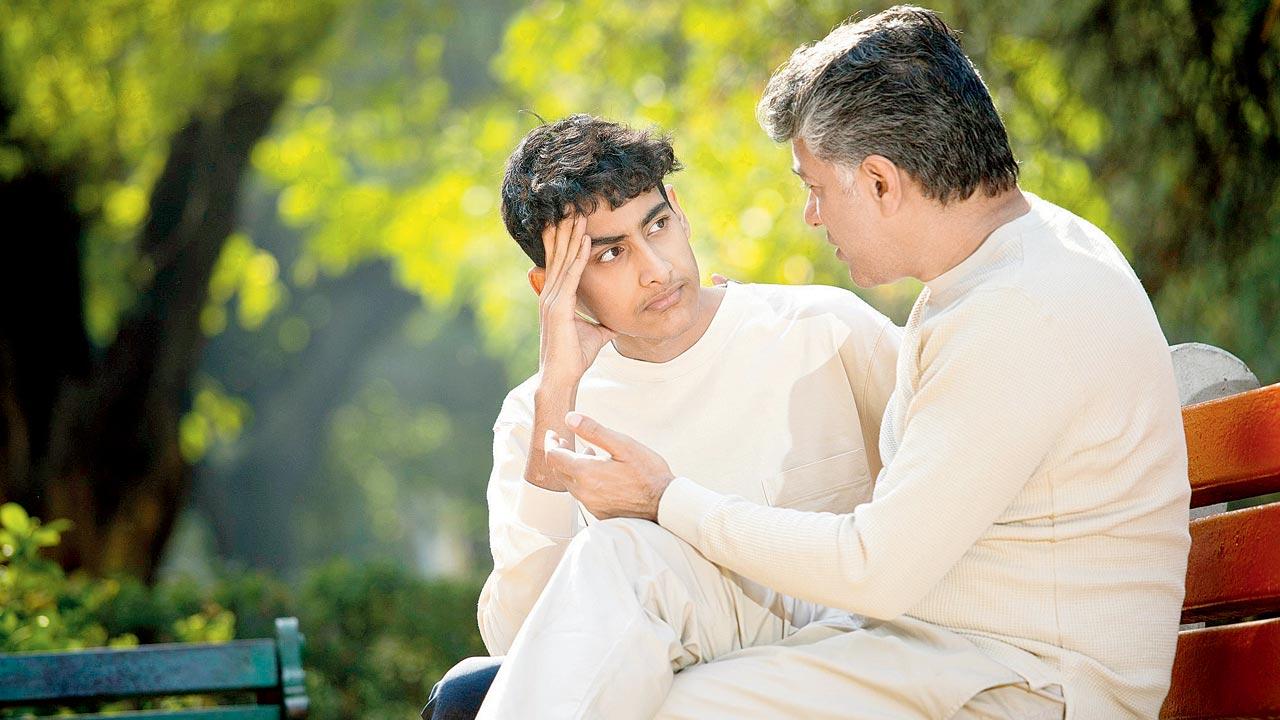At what point does parental leniency convert into complicit and enabling behaviour that can threaten to rub off on their children? From the Worli hit-and-run brat to the trainee IAS officer in Pune, examples abound of this troubling scenario around the ethics of parenting

(Left) Vishal Agarwal, father of the teen acussed of killing two people with his luxury car in an inebriated state in Pune, gets arreasted. FILE PIC; (right) grandfather Surendra Kumar; (in pic) mother Shivani breaks down in a video. Pic Courtesy/X
Recent revelations about Manorama Khedkar, mother of disgraced trainee IAS officer Puja Khedkar, serve only to cement the expression ‘a chip off the old block’. Manorama has been accused of attempting to usurp land from a farmer by threatening him with a pistol and is being investigated for unlawful possession of the said firearm. But if you’ve been following recent headlines, you probably already know that this isn’t the only instance of misbehaving children and worse-behaving parents in recent times. Take, for instance, Mihir Shah of the infamous BMW hit-and-run case in Worli, whose family came together to help him flee after he mowed down a couple in the most heinous way. The 1,000-tonne elephant in the room that’s now staring us in the face is a complex one — is India’s parenting fundamentally broken?
ADVERTISEMENT
Apart from being a child’s primary caregiver, a parent is also responsible for instilling in the child a strong value system, as well as basic recognition of both right and wrong. But when the parents in question not only enable their children’s misdeeds but also go great lengths to shield them from what can only be considered natural consequences of their erroneous ways, are their actions not contrary to their parental responsibilities?
 In a viral video, trainee IAS officer (left) Puja Khedkar’s mother (above) Manorama is seen brandishing a firearm to allegedly threaten a farmer
In a viral video, trainee IAS officer (left) Puja Khedkar’s mother (above) Manorama is seen brandishing a firearm to allegedly threaten a farmer
A societal concern?
“We all belong to what we believe. The educated middle-class believes in qualities such as liberty and equality. We believe that now that such cases have come into the limelight, rich families will be very cautious as they will be next. But, if we consider things from the contrarian perspective of an inherently feudal society, the way such cases are handled, and the ease with which they are dismissed, set a terrible precedent. Those who have the means do not perceive these as a deterrent but rather with the smug understanding that they will be more successful in tricking the system because they know what to look out for. It doesn’t help that the parents of the offending children are politically influential. They believe they enjoy the privilege of impunity,” says Dr Piyul Mukherjee (PhD) an eminent sociologist and founding partner of Quipper Research.
 Rajesh Shah was arrested for his son (in pic) Mihir Shah’s involvement in the hit-and-run case in Worli. File pics
Rajesh Shah was arrested for his son (in pic) Mihir Shah’s involvement in the hit-and-run case in Worli. File pics
“There isn’t enough evidence or research done to state that parenting patterns are changing. We are seeing more of it because we live in an increasingly connected world. We know more about each other now. We also have more access to information that tells us how things should have been and how they can be. Parenting within the social and cultural context of class and caste additionally plays a role in how children are socialised. If I grow up seeing the ‘didi’ who cooks for us having her tea in a separate cup meant for her, I learn that differences exist. As a child, I may internalise that I’m more than the didi and what didi can have is limited. A child needs to be taught to ask ‘why’. Why does didi have tea in a different cup? Why do some children not have shoes to play in? Without this, we are perhaps bringing up children who are disconnected with community and humanity. We risk our children being selfish or ignorant. They become adults who feel entitled to having what they want. Sometimes at the expense of others,” shares a psychotherapist, who requested to remain unnamed. She added that in terms of parenting, not teaching children to take responsibility, or holding them accountable, and protecting them from consequences at an early age can shape a child and the person they can become.
 The conversations you have with and around your children form the foundation for the people they grow up to be. Representation pic
The conversations you have with and around your children form the foundation for the people they grow up to be. Representation pic
When we spoke with Dr Sagar Mundada, a psychiatrist at Health Springs, he admitted that he has been observing rising instances of parents being permissive or extra lenient, even when their child’s behaviour warrants otherwise. “Although very extreme cases [including those cited by this article] are quite rare, we notice more parents choosing to look the other way when a young child misbehaves. This could be considered a by-product of today’s ultra-nuclear families where working parents try to suppress their own guilt about not spending enough time with their families by offering hand-outs. They justify it by telling themselves that the child is too young to know any better, and probably doesn’t mean anything by it. And so, they miss passing on the crucial interplay of action-and-consequence to the child,” he explained.
 Nahid Dave and Piyul Mukherjee
Nahid Dave and Piyul Mukherjee
Set the record straight
More often than not, parenting is picked up by parents as they raise their children, and not consciously considered or planned. And so, most parents tend to impart in their children the morals that have been set for them by their own parents, as well as those they have imbibed from their own (often skewed) worldview. In doing so, they often repeat and exacerbate the same mistakes their parents made, or attempt to parent using techniques that aren’t relatable in today’s world, clarified Dr Nahid Dave, a psychiatrist at Thought Matters. She also laid down a few basic guidelines for parents seeking to raise them right:
. Identify and express: It is a parent’s job to teach a child to identify their emotions and express them in healthy ways. Failing this, a child learns to deal with his/her emotions either through aggression or suppression.
 Dr Sagar Mundada
Dr Sagar Mundada
. Model the right behaviour: The most crucial lessons in ethics that parents can teach their children come from their own behaviour and choices. As parents, you have to practise what you preach.
. Cultivate consequential thinking early in life: Help your child to understand that different actions have different consequences and that these consequences are inevitable. Don’t let your child off the hook under the garb of caring or support — you are doing them much more harm than good.
. The ideal role models: The conversations you have with and around your child tells him/her a lot about the kind of behaviours, and people you appreciate and admire. If you constantly accord more importance to wealth and power over traits such as academic merit and hard work, your child learns to prioritise the former, with scant regard for the latter.
. Avoid extreme and immediate gratification: If you find it difficult to say ‘no’ to your child, your child will grow up finding it extremely difficult to either say or accept a ‘no’. Spoiling your child with materialistic gifts to compensate for quality time spent with them will make your child entitled. But what parents don’t realise is that it can also cause low esteem and anxiety in their children as their sense of self is almost entirely defined by their materialistic belongings. Learn to not gratify your child’s urges immediately. Give them the gift of time and not things.
 Subscribe today by clicking the link and stay updated with the latest news!" Click here!
Subscribe today by clicking the link and stay updated with the latest news!" Click here!







